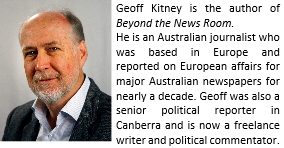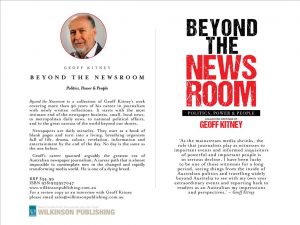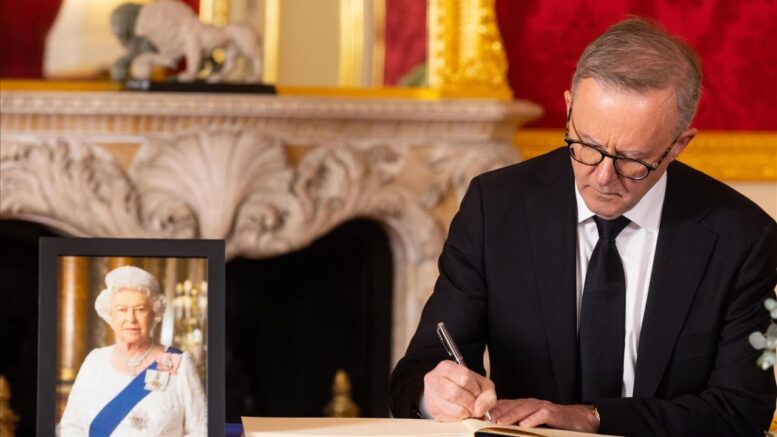The prime minister says protocol requires him to declare allegiance to the new King. Australians are not happy, writes Geoff Kitney.
There will be more than one controversial guest at today’s coronation of King Charles III.
But unlike Prince Harry, this is one whom few attending would imagine was a contentious participant in the pomp and ceremony that will result in the confirmation of Charles as the monarch of Britain and her commonwealth monarchies.
One of those countries for whom Charles will become King is Australia. The nation will be represented at Westminster Abbey by Prime Minister Anthony Albanese and the King’s representative in Australia, Governor-General David Hurley.
In times gone by this would have been a totally unremarkable matter. But not this time.
While few but hard-line Australian republicans are openly calling for Albanese to boycott the coronation, a much larger number of Australians are unhappy that he intends to declare allegiance to the new King – as he says protocol requires him to do.
They would prefer that Albanese – a declared republican – makes it plain that his participation in the coronation will be a matter of common courtesy rather than a symbol of Australia’s allegiance to the new monarch.
Many of those who favoured the idea of a republic did so with the caveat ‘only after Queen Elizabeth dies’. They are now freed from that constraint.
The coronation of King Charles comes at a point in Australian history when a majority of its citizens believe this should be the last time a British man or woman becomes the head of state of Australia, a position no Australian citizen is eligible to fill.
There is a powerful view in the governing Australian Labor Party that their leader, Albanese, should be the Australian Prime Minister who completes the task begun three decades ago by then Labor Prime Minister Paul Keating. In 1993 Keating visited Queen Elizabeth II at Balmoral Castle to inform her that he intended to begin the process of making Australia a republic.
Keating never got to fulfil that task. He lost the subsequent election and his successor – the deeply conservative John Howard – called a referendum on the republic then campaigned vigorously to defeat it. The republican cause suffered from disagreement about what form an Australian republic should take and the proposition was comfortably defeated.
But much has changed since then.
The Queen has died.
Many of those who favoured the idea of a republic did so with the caveat “only after Queen Elizabeth dies”. They are now freed from that constraint.
Also, a new generation in an increasingly multicultural Australia has become eligible to vote and a whole generation of pro-British, pro-monarchy Australians has passed on. Even Brexit has had an impact. A lot of Australians see Brexit as a great folly, leading to the decline of Britain.
And there is a significant new political factor in the republican equation.
Australia has entered into a period of deep reflection about the national story and what it means to be Australian.
The trigger for this is a commitment made by the Labor government (elected a year ago after a decade of conservative rule) to come to a new settlement with Australia’s oldest inhabitants – Aboriginal and Torres Strait Islanders.
The Albanese government has committed to holding a referendum later this year on a proposal to amend the Australian constitution to provide for a Voice to Parliament for indigenous Australians.
The Voice would provide a means for Aboriginal people to make direct representations to government on issues affecting indigenous Australians, across the spectrum of policy.
The Voice is being seen as an historic step which, if the referendum succeeds, will help right wrongs that go back to the first days of European settlement, when Britain claimed Australia as its territory and declared it as “terra nullius” – belonging to no-one.
Whereas, nations such as Canada and New Zealand, negotiated treaties with their indigenous populations, recognising them as the prior owners of the land, Australia has never had any sort of treaty with its pre-European settlement populations. The deep historical and spiritual connections of Aboriginal people with the land and the rights they could claim because of them were wiped out.
The blanket dispossession of Aboriginal people by European settlement is widely recognised as the fundamental factor in the suffering that has marked indigenous history since Captain James Cook set foot on Australian soil in 1770 and claimed it as British territory. On almost every measure of their wellbeing, Aboriginal Australians today live vastly inferior lives to other Australians.
To provide a constitutional basis for The Voice Australians will be asked in a referendum to support a new clause in the Constitution which recognises Aboriginal people as “the First people of Australia” and establishes a process by which they can make representations on issues affecting them.
Political debate about the proposed referendum has triggered an intense national debate about the impact of British colonialism and calls for an honest debate looking at the bad as well as the good. Supporters of the case for an historic righting of the wrongs of colonialism argue that Australia has long turned its face away from the bad – especially for First Nations people.
This has inevitably spilled into the debate about an Australian republic and the view that the time has long since passed when Australia should have cut its constitutional ties to the United Kingdom. A “yes” vote for The Voice is being seen as a perfect trigger for the move to change the constitution to establish an Australian republic.
But a “yes” to The Voice is anything but assured.
The proposal has become quite divisive.
The conservative Liberal-National Party coalition has declared it will lead the campaign against the referendum – just as it did against a Republic. It argues that the proposed change to the Constitution is, in effect, racist. It also argues that it will add another layer of bureaucracy which will worsen rather than improve the situation of the indigenous population.
It has recruited some prominent Aboriginal figures to the cause – seriously complicating the issue for Australian voters.
And the intensifying debate is bringing out some deeply nasty racial undercurrents in Australian society which have always played a role in the struggle to improve the plight of indigenous Australians.
Polls show that support for The Voice has been slowly eroding, even though it still has a narrow majority of support.
Republican campaigners fear defeat of the referendum for The Voice might discourage the Albanese government from pressing ahead with a second referendum on the republic.
The coronation of King Charles comes at a point in Australian history when a majority of its citizens believe this should be the last time a British man or woman becomes the head of state of Australia, a position no Australian citizen is eligible to fill.
Which gets us back to the coronation.
Albanese is under pressure to ensure that there is no backsliding on the republic and therefore to spell out clearly and strongly that, while Australians wish the new King well, their government is absolutely committed to taking the constitutional steps to ending its colonial ties with Britain and with the monarchy during King Charles III’s reign.
For this reason, Australians will be taking a special interest in the coronation which goes well beyond enjoying the spectacle of the pomp and ceremony confirming Charles as King of Australia.
Headline image credit: Salma Bashir Motiwala/Shutterstock.com






